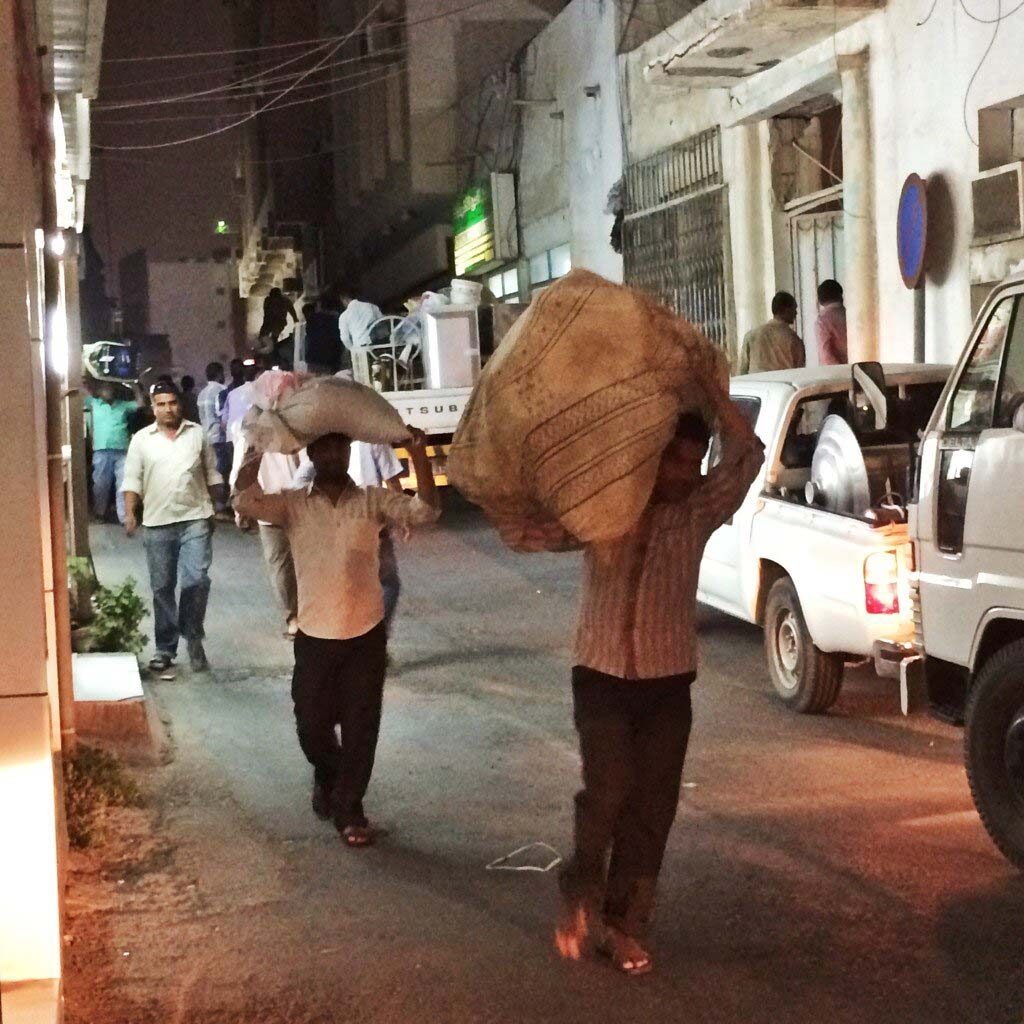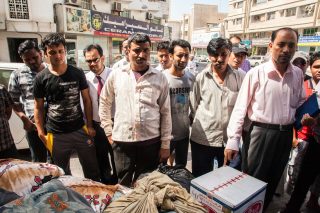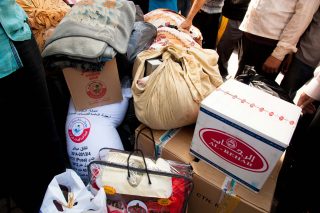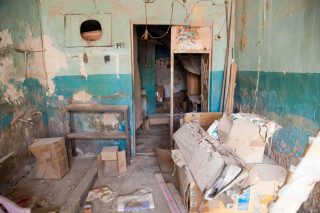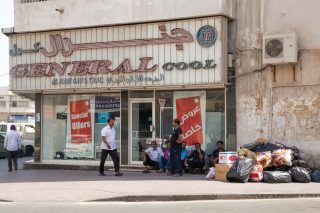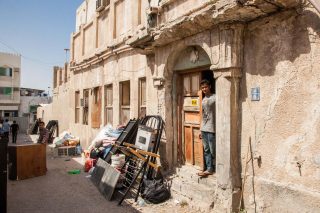All photos by Chantelle D’mello
Hundreds of residents in Qatar’s downtown area of Musheireb were forcibly removed from their apartments by police officials yesterday, effectively leaving the men homeless for the night and scrambling for new accommodation today.
According to witnesses, Internal Security Forces (ISF) showed up at around 9:30pm on Tuesday night, supervising an exodus that lasted around two hours.
Speaking to Doha News, MD Faiyaz, a 32-year-old resident who was at work when the mass evictions began, said:
“I was at Al Sadd and got a phone call saying that the police were at our apartment. They were breaking down doors, hitting people and throwing them out of the houses.”
Faiyaz said he lived with seven others in a studio apartment with five beds.
The Nepali expat, who works as a tailor at the Al Wadi Group, said that no prior notice had been given to the residents of his building, but added that other nearby complexes had been served eviction notices by the Ministry of Municipality and Urban Planning (MMUP) a month prior to yesterday.
Other residents were given a warning two months ago, when in April, the electricity was shut off at several residential buildings in the Musheireb area, prompting a chorus of complaints from some of the thousands affected.
Abdullah Sayed, who was evicted yesterday, said that the power in his home had been cut off two months ago. But the developer of his building restored the electricity when complaints were made.
However, Sayed said no other information was communicated to the residents following the incident.
“No one has come by to collect rent for the past two months,” he added. “We have an agreement with (our landlord) to stay here, but no one has come by yet.”

Several of the buildings in the Musheireb area have been marked for demolition to make way for newer, more upscale developments.
But the majority of the thousands of people residing in the Musheireb area are low-income Asian expats from Nepal, Bangladesh, Sri Lanka, India and Pakistan, who said at the time that if they lose their homes, they’ll have nowhere else to go.
Searching for solutions
Another expat who lost his housing yesterday is Badruddin, a 31-year-old Nepali salesman who works for Amir Perfumes. He said:
“Friends of mine who were in the area and who live with me called me up and told me that red police cars (ISF) were in the area. They rounded people up and gave them five minutes to get all their things out of the apartments.”
Both Faiyaz and Badruddin – who resided in the same building – spoke to Doha News this afternoon while sitting on the pavement under the shade of a building in Musheireb, next to their belongings.
They said they spent this morning searching the city for affordable apartments, to no avail. Currently, the two said they make about QR2,000 each a month, and are given QR200 as a housing allowance.
When asked about how their employers have responded to their housing crisis, Faiyaz said:
“They told us to take the morning off to go look for apartments, but apart from that, we received no other information.”
Ramadan woes
Several of the people who lost their homes told Doha News that they spent half of last night on the street, and the other half in the same rooms from which they were evicted.
“We tried to sleep, but we were scared that the police would come in again and start throwing us out,” Faiyaz said.
The evictions come as the first week of Ramadan comes to a close, leaving many of the workers observing the holy month with no food and no housing.
The prohibition on eating and drinking in public has also posed a challenge for the now pavement dwellers. Many food shops are closed until sunset, and if the men do obtain anything to eat, they could get fined for doing so publicly.

The day after the eviction, numerous people could be seen moving more of their belongings from the buildings to the streets.
Blankets, suitcases, towels and clothes could be observed in the area’s alleys and and street corners.

In some places, doors were broken down and ripped off their hinges. According to eyewitnesses, internal security forces who had enforced the evictions last night had caused the damage.
Many people who spoke to Doha News complained that unnecessary force was used during the eviction.
Longtime resident Lubaib Gazir, who saw the men being removed from their homes and posted about it on social media, said:
“Some even had tears in their eyes, and most of them (were) just packing up whatever things they could from their houses – AC frames, gas cylinders, rice bags, clothes etc. Most of them didn’t know where to go next to spend their night, and were just waiting outside on the street clueless.
It was such a sad scene seeing everyone flee out of their homes getting whatever they could from inside! It was kind of a night which I never saw in Doha before.”
And Sayed, who is still looking for housing, said:
“They could have said it nicely, but they didn’t. There was no humanity. Just force.”
He also asked Doha News if any humanitarian workers would be on their way.
When reached by phone today, a Nepali embassy representative said they were unaware of the problems facing some of their nationals, adding they could only look into the matter if someone filed a report.
Thoughts?
Note: This article has been updated to reflect that Badruddin and his friend make about QR2,000 a month, not QR1,000, as was initially told to Doha News.

